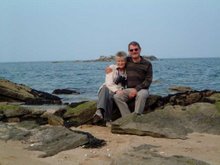Yesterday we left Tucson and drove due north to Flagstaff,
still in Arizona, and a good base from which to see the Grand Canyon. Leaving
Tucson, the road stayed on the flat Sonoran Desert for 150 miles, well past
Phoenix, but then steadily climbed towards Flagstaff’s 7,200 feet altitude. We
passed patches of snow in the ponderosa pine forest after we passed the 6,000
ft. roadside marker. It wasn’t much above freezing when we arrived and it
quickly dipped to zero after sun set, and then on down to minus 4ºC. Come back
desert, we shouldn’t have deserted you!
We had booked an organised tour of the Grand Canyon South
Rim with All-Star Tours, and I must say they gave us a superb day out by any
standards, with precision organisation and an excellent guide. We were picked
up at the campsite for the 1½ hour drive to the South Rim. Soon we were
climbing again. At the 8,000 ft. marker, snow was thick on the ground as the
photo shows. A bit higher up there’s a small ski resort where our tour
guide is also an instructor.
We descended again for the South Rim to arrive at Grand
Canyon Village, still pretty high up at 6,800 feet. That first view of the Canyon,
if you’ve never seen it before, is absolutely breathtaking. It’s 10 miles
across, a mile deep, and 277 miles long following the snaking Colorado River.
The colours of the different rock levels add to the
overwhelming spectacle. Our guide took us to a number of different locations
from where we could appreciate the subtle differences of the colours and views.
I’ll follow with a few photos to illustrate.
The canyon was created by movements of the Earth’s plates
with the Colorado River carving a further deep gorge in which it is mostly hidden.
It is visible over my left shoulder, a mile down. You can white-water raft it,
if you’re brave enough, as the current flows in some places at 20 mph and some
of the rapids fall into the most difficult category when the river is running
full. John Wesley Powell, a one-armed Civil War veteran, let the first
expedition to navigate the Colorado River in 1869. The expedition took rather a
long time but then maybe a one-armed canoeist isn’t an ideal formula.
Our last viewing stop was from the Desert View Visitor Center where an
Ancient Pueblo People’s watch tower had been recreated, but with added height,
and including traditional paintings in the interior. Not much is known about these
tribes so I’m not sure how much imaginative licence was used.
The tower also gave us a fantastic final view of the canyon
including the most visible part of the river. Maybe the ancient tribes built their
towers to enjoy the lovely views just like us tourists.
We then headed back the 70 miles to Flagstaff taking another
route through the Navajo Reservation. Here we ran along the Little Colorado
River that runs into the Colorado proper, and its gorge a mere 1,500 feet deep!
This was the site of a tightrope walk by a certain Nik Wallenda in 2013 without
a safety net. This kind of stunt is not allowed in the Grand Canyon National
Park, but Indian Reservations are legally a state within a state and make their
own laws and regulations. I suppose pow-pows and peace-pipes are just as
effective as arbitration and conciliation tribunals.
We were lucky in having a fine clear day, and it had all amounted
to a truly awesome experience.









No comments:
Post a Comment